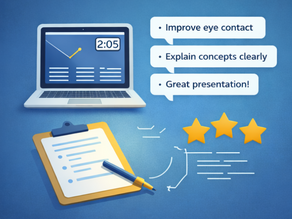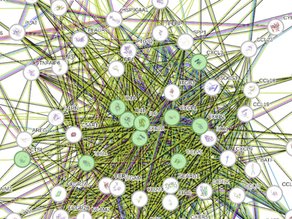top of page
Latest Blog Posts


Simulating Success: An AI-Powered DECA Judge for Realistic Practice
Preparing for DECA competitions often means practicing alone, imagining questions, and hoping feedback from teachers or peers is enough. After building my original Scenario Generator, I wanted to take practice one step further. The result was an interactive AI system that simulates real DECA judges and creates a complete role-play experience that feels realistic, challenging, and personalized. This system allows students to engage in real-time conversations with an AI judge p
Jan 32 min read


Using AI to Improve DECA Role-Play Practice
DECA role-play events are built on one key challenge: being ready for anything. From my own experience competing in DECA, I realized that one of the hardest parts of preparation is finding enough high-quality, diverse practice scenarios. Many students end up practicing the same situations repeatedly, which limits their ability to adapt during real competitions. To address this problem, I created an AI-powered Scenario Generator designed specifically for DECA role-play prepara
Dec 29, 20252 min read


Proton Gradients, Energy Efficiency, and the Future of Artificial Intelligence
A major idea in Nick Lane's book Transformer is that life depends on managing energy differences, especially proton gradients across membranes. Nick Lane describes how all complex life relies on these gradients to power cellular processes. This concept has surprising relevance to modern artificial intelligence and computational systems. In biology, proton gradients are created across membranes in structures like mitochondria. These gradients store potential energy, similar t
Dec 18, 20252 min read


The Krebs Cycle as Nature’s Original Algorithm
In Transformer , Nick Lane argues that life is not just chemistry, but a system of energy flow, transformation, and information processing. One of the best examples of this idea is the Krebs cycle. Also known as the citric acid cycle, the Krebs cycle shows how biology uses step by step processes that strongly resemble algorithms used in computational biology and artificial intelligence. The Krebs cycle is a circular metabolic pathway that takes simple molecules derived from f
Dec 2, 20252 min read


Exploring How Multi-Agent Systems Develop Their Own Language
When we think about artificial intelligence, we often imagine smart machines that can talk to humans. But what happens when AI systems need to talk to each other? In my recent research, “To What Extent Do Multi-Agent Systems Use Compositionality in Multi-Agent Interactions?”, I explored how AI agents develop and use communication to cooperate on shared goals. I trained AI agents using a speaker-listener setup where one agent had to describe a goal, and the other had to act on
Nov 6, 20252 min read


From Sequence to 3D Shape: AI’s Breakthrough in Protein Folding
Proteins are often called the workhorses of life because they do so many critical jobs in our cells. But to really understand how a...
Apr 9, 20252 min read


The Essential AI Toolkit for Modern Biology
If you’ve been hearing about how artificial intelligence is changing drug discovery, genomics, and more, you might wonder: How do scientists actually build and use these AI models? Thankfully, there’s an ever-growing set of tools and platforms that make AI accessible to biology labs of all sizes. First, there are general-purpose frameworks like TensorFlow (from Google) and PyTorch (from Meta). These give researchers the core building blocks to develop custom AI models—every
Mar 20, 20252 min read


The Latest AI Success Stories in Computational Biology
The fusion of AI and computational biology has been on fire for the last couple of years. From groundbreaking research papers to real-world drugs entering clinical trials, the field has never looked more promising. Here are some highlights: One big moment was in 2022, when AlphaFold released predicted structures for nearly every protein sequence known—over 200 million! Scientists could just look up a predicted model on a public website for free. This database is speeding up
Mar 10, 20252 min read


AI Sparks a New Era in Drug Discovery
Have you ever wondered how new medicines are developed? It’s a process that typically takes years, or even decades, and can cost billions of dollars. Scientists have to sift through thousands of possible drug candidates, run tests in labs, and finally move to human trials. But today, artificial intelligence (AI) is making that search faster and more precise than ever before. The starting point in drug discovery is often target identification. This means finding which protein
Mar 10, 20252 min read


How AI is Helping Us Predict and Understand Diseases
When people get sick, doctors usually rely on their expertise and medical tests to decide how to treat them. But what if we could use computers to analyze giant datasets—patient histories, lab tests, genetic profiles—to predict how the disease will progress and what treatments will work best? That’s exactly what AI-driven disease modeling is all about. One big area is disease progression prediction. Take Alzheimer’s disease, for example. Researchers can train AI algorithms o
Feb 12, 20252 min read


How AI is Cracking the Code of Our Genes
Genomics and transcriptomics are all about understanding our genetic blueprint and how genes get expressed as RNA. With modern technology, scientists can sequence entire genomes and measure RNA levels in thousands of cells at once. But that produces massive amounts of data. This is where AI steps in. Imagine trying to spot a small typo in a billion-letter text. That’s kind of like searching for a disease-causing mutation in human DNA. Traditional tools have done a decent job,
Jan 17, 20252 min read


Using AI to Facilitate Perspective Changes on Controversial Topics: A Preliminary Study
Introduction In an era of increasing polarization, understanding how artificial intelligence can facilitate meaningful dialogue on...
Dec 8, 20242 min read


miRcore Computational Biology Camp
At the Mircore camp for computational biology, we were tasked to research a specific multifactorial disease and then find certain gene...
Jul 4, 20241 min read
bottom of page
